| Listing 1 - 10 of 11 | << page >> |
Sort by
|
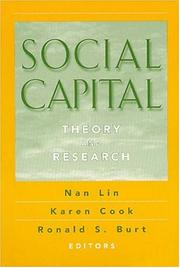
ISBN: 0202306445 Year: 2001 Publisher: New York (N.Y.) : Aldine de Gruyter,
Abstract | Keywords | Export | Availability | Bookmark
 Loading...
Loading...Choose an application
- Reference Manager
- EndNote
- RefWorks (Direct export to RefWorks)
Social capital (Sociology). --- Social networks. --- Social structure.
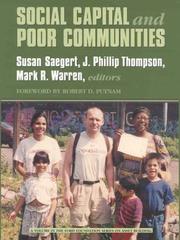
ISBN: 0871547333 Year: 2001 Publisher: New York (N.Y.) : Russell Sage Foundation,
Abstract | Keywords | Export | Availability | Bookmark
 Loading...
Loading...Choose an application
- Reference Manager
- EndNote
- RefWorks (Direct export to RefWorks)
Community development --- Social capital (Sociology) --- Urban poor

ISBN: 087584913X Year: 2001 Publisher: Boston Harvard Business School Press
Abstract | Keywords | Export | Availability | Bookmark
 Loading...
Loading...Choose an application
- Reference Manager
- EndNote
- RefWorks (Direct export to RefWorks)
Corporate culture --- Organizational behavior --- Quality of work life --- Social capital (Sociology)
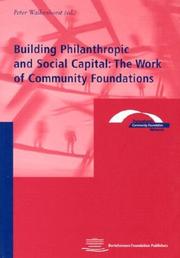
ISBN: 3892045631 Year: 2001 Publisher: Gütersloh Bertelsmann Stiftung
Abstract | Keywords | Export | Availability | Bookmark
 Loading...
Loading...Choose an application
- Reference Manager
- EndNote
- RefWorks (Direct export to RefWorks)
Charity organization --- Civic improvement --- Community foundations --- Donor-advised funds --- Social capital (Sociology)
Book
Year: 2001 Publisher: Washington, D.C. : World Bank,
Abstract | Keywords | Export | Availability | Bookmark
 Loading...
Loading...Choose an application
- Reference Manager
- EndNote
- RefWorks (Direct export to RefWorks)
"Social capital initially derives from social theory, and from the broad idea that social relationships are resources that help people act effectively"--A definition by the late James Coleman, one of the first social scientists to use the term in the 1970s." "Social capital has since then quickly entered the common vernacular of our discussions about the connectedness of citizens to their community. It remains, however, a concept that is not easily defined. There lies the impetus for this book, which presents theoretical and empirical studies of social capital by a roster of leading sociologists, economists, and political scientists. It is an outgrowth of a workshop, held at the World Bank in April 1997, which was devoted to exploring the concept of social capital through a multidisciplinary forum."--Jacket.
Economic development --- Human capital --- Infrastructure (Economics) --- International comparisons. --- Interpersonal relations --- Reliability (Engineering) --- Social capital (Sociology) --- Social networks --- Social order. --- Social structure --- Social values. --- Statistics. --- Trust. --- Social aspects
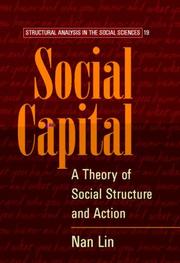
ISBN: 0511815441 1280416904 0511153155 0511303386 0511053096 0521474310 0511173881 0511019475 052152167X 9780521474313 9780511815447 9780521521673 1107112591 9780511019470 9780511053092 9781280416903 9786610416905 6610416907 Year: 2001 Volume: 19 Publisher: Cambridge New York Cambridge University Press
Abstract | Keywords | Export | Availability | Bookmark
 Loading...
Loading...Choose an application
- Reference Manager
- EndNote
- RefWorks (Direct export to RefWorks)
In Social Capital, Nan Lin explains the importance of using social connections and social relations in achieving goals. Social capital, or resources accessed through such connections and relations, is critical (along with human capital, or what a person or organization actually possesses) to individuals, social groups, organizations, and communities in obtaining their objectives. This book places social capital in the family of capital theories (the classical and neo-capital theories), articulates its elements and propositions, presents research programs, findings, and agenda, and theorizes its significance in various moments of interactions between individual actions and social structure (for example, the primordial groups, social exchanges, organizations, institutional transformations and cybernetworks). Nan Lin eloquently introduces a groundbreaking theory that forcefully argues and shows why it is 'who you know', as well as 'what you know' that makes a difference in life and society.
Social capital (Sociology) --- Social networks. --- Social action. --- Social policy --- Social problems --- Networking, Social --- Networks, Social --- Social networking --- Social support systems --- Support systems, Social --- Interpersonal relations --- Cliques (Sociology) --- Microblogs --- Capital, Social (Sociology) --- Sociology --- Social capital (Sociology). --- Social Sciences --- SOCIAL NETWORKS -- 301.162.2 --- SOCIAL NETWORKS -- 301.187 --- SOCIAL CAPITAL -- 323.29 --- SOCIAL NETWORKS -- 323.29 --- SOCIAL STRUCTURE -- 323.29 --- STATUS -- 301.151 --- Capital social (Sociologie) --- Réseaux sociaux --- Action sociale --- Social action --- Social networks

ISBN: 1586031902 Year: 2001 Publisher: Amsterdam Berlin Oxford : IOS Press,
Abstract | Keywords | Export | Availability | Bookmark
 Loading...
Loading...Choose an application
- Reference Manager
- EndNote
- RefWorks (Direct export to RefWorks)
State, The --- Human capital --- Social capital (Sociology) --- Social policy --- #SBIB:324H20 --- #SBIB:35H006 --- #SBIB:033.IOS --- National planning --- State planning --- Economic policy --- Family policy --- Social history --- Capital, Social (Sociology) --- Sociology --- Human assets --- Human beings --- Human resources --- Capital --- Labor supply --- Administration --- Commonwealth, The --- Sovereignty --- Political science --- Politologie: theorieën (democratie, comparatieve studieën….) --- Bestuurswetenschappen: theorieën --- Economic value --- Latin America --- Asociación Latinoamericana de Libre Comercio countries --- Neotropical region --- Neotropics --- New World tropics --- Spanish America --- Social conditions --- -Social conditions --- -Social policy. --- Human capital. --- Social policy. --- State, The. --- Social capital (Sociology). --- Etat --- Ressources humaines --- Inégalité sociale --- Développement économique --- Amérique latine
Book
ISBN: 2747502864 9782747502863 Year: 2001 Publisher: Paris : L'Harmattan,
Abstract | Keywords | Export | Availability | Bookmark
 Loading...
Loading...Choose an application
- Reference Manager
- EndNote
- RefWorks (Direct export to RefWorks)
Marginality, Social --- Human rights --- Unemployment --- Social capital (Sociology) --- Marginalité --- Droits de l'homme (Droit international) --- Chômage --- Capital social (Sociologie) --- Exclusion sociale --- Chomage --- Aspect social --- Marginalité --- Chômage --- Ausschluss. --- Capital social (Sociologie). --- Exclusion sociale. --- Gesellschaft. --- Marginality, Social. --- Marginalität. --- Pauvres --- Unemployment. --- Aspect social. --- Travail. --- France. --- Chomage - Aspect social

ISBN: 926428589X 9264289518 Year: 2001 Publisher: Paris : OECD Publishing,
Abstract | Keywords | Export | Availability | Bookmark
 Loading...
Loading...Choose an application
- Reference Manager
- EndNote
- RefWorks (Direct export to RefWorks)
Dans un monde en rapide évolution, le progrès des nations, des sociétés et des individus est probablement plus que jamais lié à leur capacité d'adaptation au changement, ainsi qu'à leur capacité d'acquisition et de partage des connaissances. Cet ouvrage précise les concepts de capital humain et de capital social, et évalue leur incidence sur la croissance économique et le bien-être. Le concept de capital social est encore assez peu documenté car il est apparu très récemment dans le domaine des sciences économiques et sociales. Aussi cette étude se fonde-t-elle sur un certain nombre d'analyses empiriques qui suggèrent l'existence de liens potentiellement importants entre le capital humain et le capital social. Il semble bien que le capital humain et le capital social puissent contribuer de manière déterminante à tout un éventail de résultats positifs, de l'amélioration des revenus au bien-être personnel, en passant par la cohésion sociale. Rien n'indique que les investissements en capital humain ou en capital social soient systématiquement insuffisants. Pourtant, on se préoccupe de plus en plus de la répartition et de la qualité de chacune de ces formes de capital et des conséquences qui pourraient en découler pour le bien-être des générations futures. Certes, les pouvoirs publics n'ont guère la possibilité de modifier la qualité, le niveau et la répartition du capital humain et du capital social à court terme. Mais à long terme, il est un certain nombre de domaines dans lesquels les acteurs publics, privés et bénévoles peuvent contribuer à améliorer le capital humain comme le capital social.
Human capital --- Human comfort --- Social capital (Sociology) --- Economic development --- Education --- Ressources humaines --- Bien-être --- Capital social (Sociologie) --- Développement économique --- Citizen participation --- Participation des citoyens --- prosperite et bien etre --- education --- politique sociale --- croissance economique --- AA / International- internationaal --- 330.580 --- 313 --- 202 --- welvaart en welzijn --- opvoeding --- sociale politiek --- economische groei --- Gecontroleerde economie. Geleide economie. Welvaarststaat. Algemeenheden. --- Levenswijze en levensstandaard. Levensminimum. sociale indicatoren (Studiën). --- Sociale organisatie. --- Bien-être --- Développement économique --- Social aspects --- Gecontroleerde economie. Geleide economie. Welvaarststaat. Algemeenheden --- Levenswijze en levensstandaard. Levensminimum. sociale indicatoren (Studiën) --- Sociale organisatie --- Employment --- Social Issues/Migration/Health
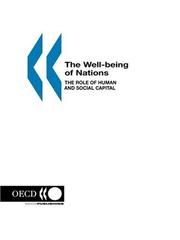

ISBN: 9264185895 9789264189515 9789264185890 9786610083732 1280083735 9264189513 Year: 2001 Publisher: Paris : OECD Publishing,
Abstract | Keywords | Export | Availability | Bookmark
 Loading...
Loading...Choose an application
- Reference Manager
- EndNote
- RefWorks (Direct export to RefWorks)
In a rapidly changing world, the success of nations, communities and individuals may be linked, more than ever before, to how they adapt to change, learn and share knowledge. This report helps clarify the concepts of human and social capital and evaluates their impact on economic growth and well-being. Although the evidence on social capital is less developed, reflecting the novelty of the concept in economic and social science, the report draws on a number of empirical studies which suggest potentially important linkages between human and social capital. The evidence suggests that human and social capital can be of key importance in contributing to a wide range of positive outcomes, including higher income, life satisfaction and social cohesion. Although there is no evidence for systematic "under-investment" in either human or social capital, concerns are expressed about the distribution and quality of each form of capital and how this might impact on future well-being. There is limited scope for public policy to change the quality, stock and distribution of human and social capital in the short-term. However, a number of areas are discussed in which public, private and voluntary actors may leverage long-term improvements in both human and social capital.
Economics --- Communication in education --- Economic development --- Education --- Human capital --- Social capital (Sociology) --- croissance economique --- education --- pays de l'ocde --- politique sociale --- prosperite et bien etre --- #SBIB:17H20 --- #SBIB:321H30 --- #SBIB:33H000 --- 330.123.6 --- 330.5 --- 710 Vorming --- #A0210A --- 330.123.6 Collectieve goederen. Dienstverlening --- Collectieve goederen. Dienstverlening --- 330.5 Volksvermogen. Gemeenschappelijk produkt --- Volksvermogen. Gemeenschappelijk produkt --- Capital, Social (Sociology) --- Sociology --- Human assets --- Human beings --- Human resources --- Capital --- Labor supply --- Children --- Education, Primitive --- Education of children --- Human resource development --- Instruction --- Pedagogy --- Schooling --- Students --- Youth --- Civilization --- Learning and scholarship --- Mental discipline --- Schools --- Teaching --- Training --- Citizen participation --- Economic aspects --- Social aspects --- economische groei --- opvoeding --- oeso landen --- sociale politiek --- welvaart en welzijn --- Sociale wijsbegeerte: algemeen --- Hedendaagse politieke en sociale theorieën (vanaf de 19de eeuw): algemeen (incl. utilitarisme, burgerschap) --- Economie: algemene werken --- Economic value --- Human capital. --- Social capital (Sociology). --- Recursos humanos. --- Citizen participation. --- Economic aspects. --- Social aspects. --- Economic development. --- Infrastructure (Economics) --- Capital, Social (Economics) --- Economic infrastructure --- Social capital (Economics) --- Social infrastructure --- Social overhead capital --- Human settlements --- Public goods --- Public works --- Development, Economic --- Economic growth --- Growth, Economic --- Economic policy --- Statics and dynamics (Social sciences) --- Development economics --- Resource curse --- Social Capital
| Listing 1 - 10 of 11 | << page >> |
Sort by
|

 Search
Search Feedback
Feedback About UniCat
About UniCat  Help
Help News
News